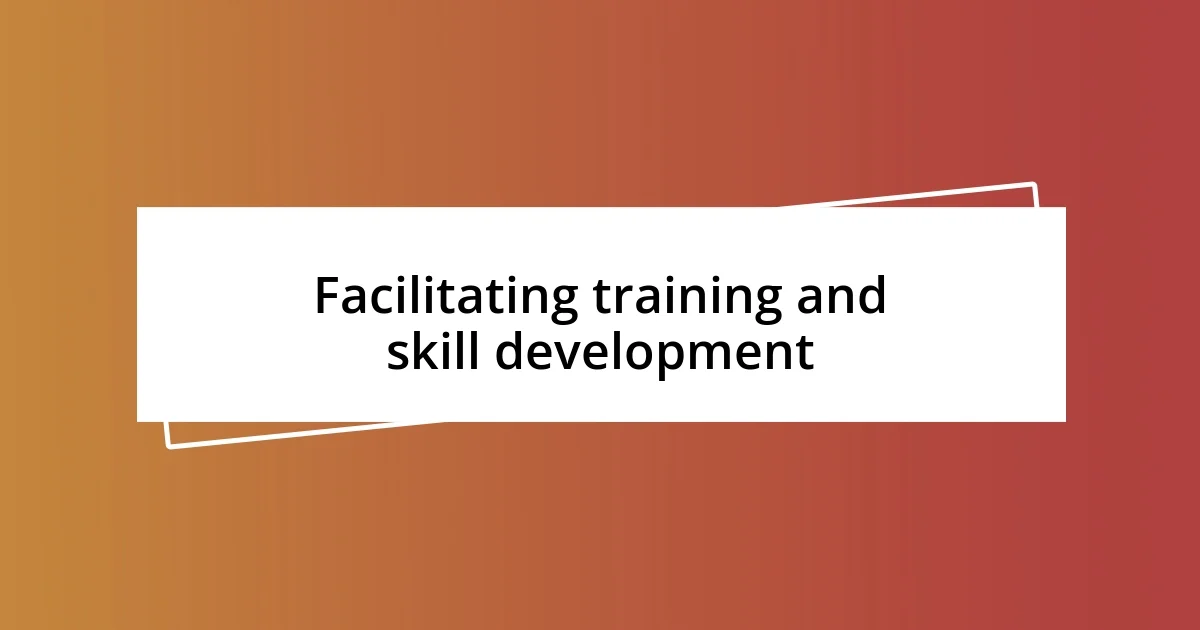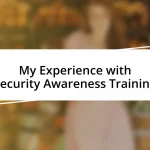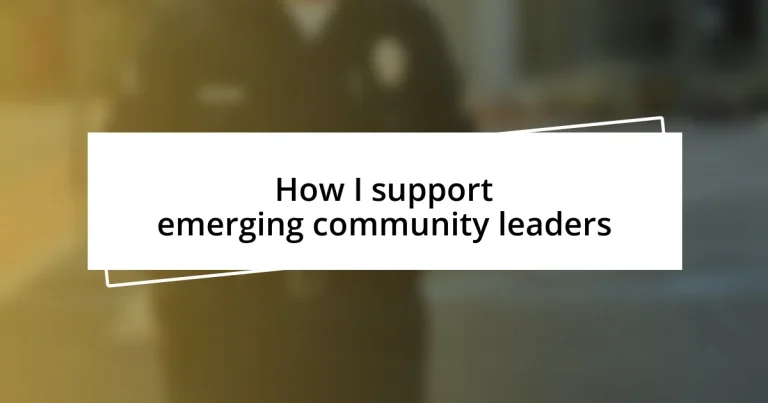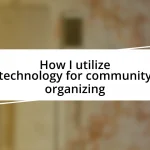Key takeaways:
- Effective community leaders embody emotional intelligence, empathy, and a commitment to inclusivity, which strengthens community bonds and fosters trust.
- Building supportive networks through mentorship and collaboration enhances the growth and confidence of emerging leaders, enabling them to tackle challenges collectively.
- Facilitating targeted training and skill development empowers leaders, fostering essential skills and igniting a passion for impactful community leadership.

Understanding community leadership roles
Community leadership roles can vary widely, encompassing titles like community organizers, advocates, mentors, and even informal leaders. I remember attending a local event where a young woman shared her experience as a neighborhood organizer. She spoke passionately about rallying her neighbors for a community clean-up, highlighting how leadership isn’t just about authority, but about inspiring others to act.
What struck me most, in my work, is that effective community leaders often wear multiple hats. They may be facilitators one day and conflict mediators the next. Have you ever noticed how some leaders really listen, creating a space for others’ voices to be heard? That ability to connect and empathize not only strengthens community bonds but also nurtures trust, which is essential for any leader.
Moreover, the emotional intelligence displayed by these leaders can’t be overstated. I once met a mentor who worked diligently to empower youth in our community, and his approach always felt so deeply personal. It’s fascinating how their awareness of community needs and individual stories shapes their leadership style, ultimately driving positive change. In your opinion, what qualities make a community leader truly remarkable?

Identifying emerging community leaders
Identifying emerging community leaders involves keen observation of individuals who actively engage with their surroundings. I recall a program in my neighborhood where newcomers quickly stepped up to initiate discussions about local issues. These interactions often reveal a leader’s natural inclination to foster dialogue and create solutions. What I find compelling is that they don’t always hold formal positions; they’re the people who step forward when a challenge arises.
Some key indicators that can help identify these emerging leaders include:
- Passionate Engagement: They often stay informed about community matters and participate in discussions.
- Inclusive Mindset: They actively seek out diverse opinions, ensuring everyone’s voice is considered.
- Problem-Solving Skills: They demonstrate creativity in tackling local issues, often suggesting innovative solutions.
- Reliability and Presence: Others turn to them for guidance or support during community events or crises.
- Empathy and Compassion: Their interactions are marked by a genuine care for others, which fosters a sense of belonging.
Through these characteristics, you can start to see who not only possesses leadership qualities but also embodies the spirit of the community. Each interaction can reveal potentials that might otherwise go unnoticed.

Building supportive networks for leaders
Creating supportive networks for emerging community leaders is vital in fostering their growth and effectiveness. I’ve seen the impact firsthand—when individuals connect with like-minded peers, their confidence often soars. For instance, when I helped facilitate a networking event, the energy in the room was palpable. Leaders shared experiences, exchanged ideas, and ultimately formed bonds that would prove essential in their journeys. I think it highlights that collaboration can amplify one’s leadership potential.
Supportive networks also serve as safe spaces for vulnerability. I remember attending a small gathering where leaders candidly discussed their struggles. It was powerful to witness how sharing these challenges fostered collective problem-solving. Each person there left feeling lighter and more equipped to tackle their roles. This level of openness nurtures trust, which is critical as these emerging leaders navigate the complexities of their responsibilities.
Lastly, mentorship within these networks is crucial. I’ve often acted as a mentor to emerging leaders, and seeing their growth feels incredibly rewarding. As we share resources and celebrate small wins, it helps them realize they’re not alone in their journey. The relationships built in these networks can provide the encouragement and guidance necessary for leaders to thrive.
| Supportive Networks | Individual Growth |
|---|---|
| Connects like-minded leaders | Boosts confidence through shared experiences |
| Offers safe spaces for vulnerability | Encourages openness and trust |
| Facilitates mentorship opportunities | Provides essential guidance and support |

Providing mentorship and coaching opportunities
Providing mentorship and coaching opportunities is incredibly impactful. I remember guiding a young leader through their first community initiative. Their hesitancy was palpable, but after a few coaching sessions, they transformed into a confident and resourceful individual. It’s moments like these that remind me how essential tailored mentorship can be to instilling self-assurance and clarity in emerging leaders.
Coaching isn’t just about sharing knowledge; it’s about building a relationship rooted in trust. I’ve experienced this firsthand, where regular check-ins allowed for open conversations about growth and setbacks. During one session, I found that my mentee was struggling with balancing personal life and leadership duties. It was through this honest discussion that we explored time management techniques which made a significant difference. Have you ever considered how a simple conversation can shift someone’s entire perspective? It’s truly amazing.
Ultimately, these mentorship opportunities pave the way for a ripple effect within communities. As I’ve watched emerging leaders succeed, they often step back into the community to uplift others. I revel in seeing them pay it forward, creating a culture of support that enhances everyone’s journey. Isn’t it rewarding to think that one conversation can spark a chain reaction of growth?

Facilitating training and skill development
Facilitating training and skill development is essential for empowering emerging community leaders. I once organized a workshop focused on public speaking, where the nervous energy was palpable. By creating a safe environment, participants opened up and engaged in exercises that sharpened their communication skills. Watching their transformations—seeing shy individuals blossom into confident speakers—reminded me how impactful targeted training can be.
One time, I introduced a leadership development program aimed at enhancing strategic thinking. Participants were encouraged to engage in simulated debates on community issues. It was fascinating to see ideas clash and new perspectives emerge. These sessions not only equipped them with essential skills but also fostered a sense of camaraderie, as everyone learned from each other’s strengths. Have you ever felt the rush of a breakthrough moment when collaborating with others? That’s the essence I strive to foster in these training environments.
Ultimately, these tailored development efforts create a stronger foundation for these leaders. I recall a participant who initially struggled with decision-making. After immersive role-play scenarios, I saw them tackle tough choices with newfound confidence. It’s a profound experience to witness someone gain the skills they once felt were out of reach. Training isn’t just about acquiring skills; it’s about igniting a passion that propels them to lead with impact in their communities.

Encouraging collaboration among leaders
Encouraging collaboration among leaders is vital for fostering a sense of community and shared purpose. I recall a time when I organized a roundtable discussion among several emerging leaders, each with unique strengths. The energy in the room was electric as they exchanged ideas and collaborated on community strategies. This experience highlighted how valuable collaboration can be in not just generating fresh ideas, but also in forging strong bonds among future leaders. Have you ever felt that rush of adrenaline when creative minds unite? It’s truly invigorating.
During one project, I paired two leaders who had disparate styles—one was methodical while the other thrived on spontaneity. Initially, they struggled to communicate effectively, and tension brewed. However, I facilitated a session to help them appreciate each other’s approaches, showcasing how their differences could complement rather than clash. By the end, they developed a joint initiative that combined their strengths, leading to innovative solutions for their community. This process unveiled an important truth: collaboration often requires vulnerability and a willingness to understand others. Have you ever witnessed the impact when people shift from competition to collaboration?
I’ve also seen firsthand how collaboration encourages accountability among leaders. Just last month, I facilitated a peer accountability group where they could openly discuss their goals and challenges. I found that providing this space not only nurtured their connections but motivated them to follow through on commitments. When leaders know they’re part of a collective effort, their drive intensifies, creating an environment ripe for growth and success. Isn’t it incredible how much we can achieve when we lift each other up?














